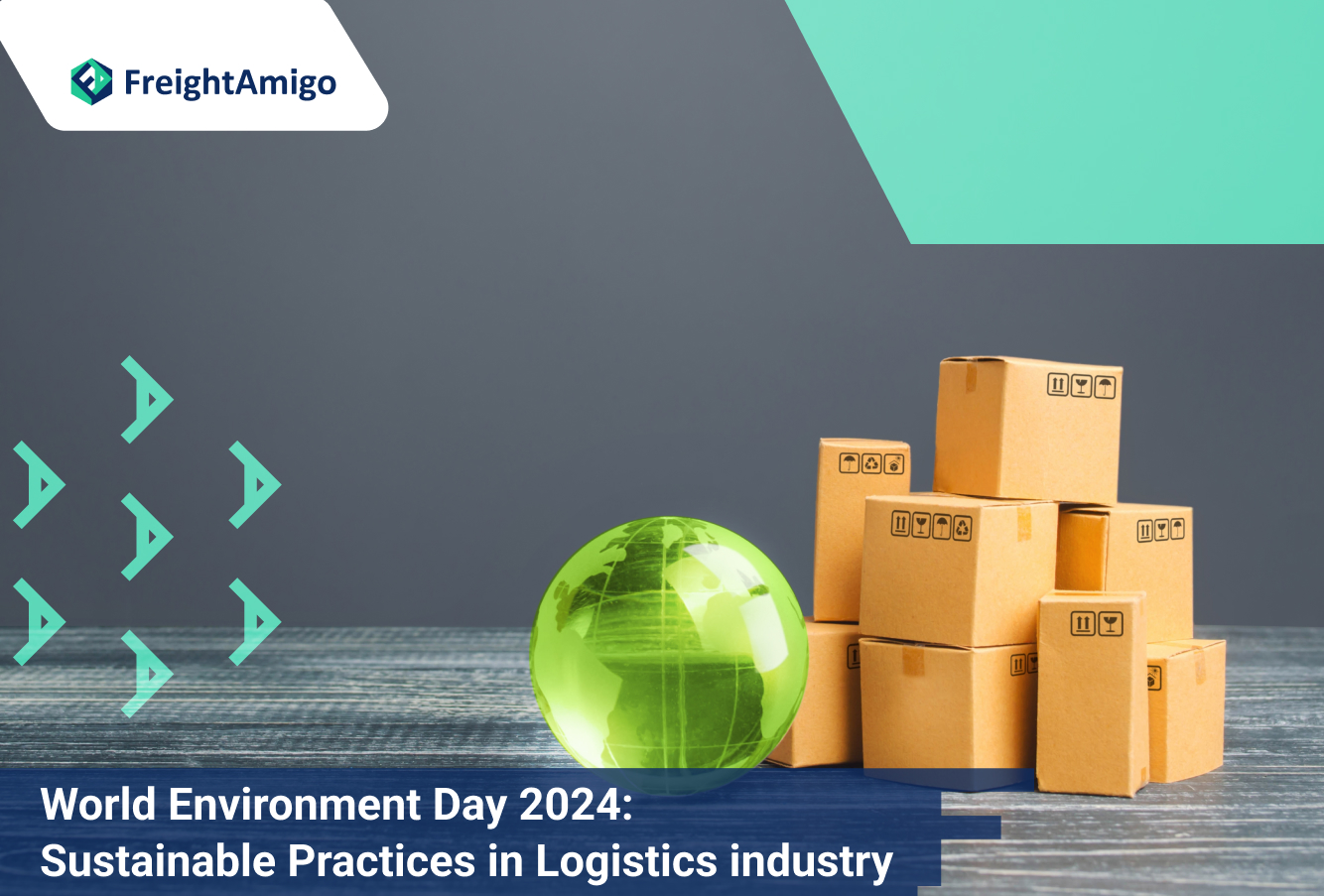Author Name: Tiffany Lee – Marketing Analyst at FreightAmigo
As we approach World Environment Day 2024, the spotlight turns once again to the crucial role of sustainability in shaping the future of our planet. Among the various sectors under this scrutiny, the logistics industry emerges as a key player, given its significant impact on global emissions and resource consumption. With transportation being a backbone of global trade and economic activity, the imperative for sustainable logistics practices becomes undeniable. Embracing sustainability within the logistics sector not only addresses environmental concerns but also paves the way for efficiency and cost-effectiveness, thereby aligning economic goals with ecological responsibility.
In this article, we delve into the transformative role of transportation and logistics in nurturing environmental sustainability. We examine innovative practices that are setting new benchmarks for reducing carbon footprints within the logistics industry, highlighting the emergence of a green supply chain as a sustainable logistics model. Through case studies, we will showcase leading companies that are making a tangible difference by integrating sustainable practices into their operations. By charting a course towards sustainability, these firms exemplify how the logistics sector can contribute to a healthier planet while also securing its own future. Our journey through sustainable logistics offers a roadmap for businesses aiming to align with ecological principles, underscoring the importance of sustainability in the logistics industry for a sustainable future.
Want To Compare The Best Express, Air Freight, Sea Freight, Rail Freight & Trucking Rates So As To Have Better Control On Cost?
The Role of Transportation and Logistics in Environmental Sustainability
Understanding the Impact of Logistics on the Environment
The logistics industry, integral to global trade, has traditionally been a significant contributor to environmental pollution. With transportation being a substantial part of logistics, the sector is responsible for a considerable portion of global carbon dioxide emissions. Innovations in sustainable logistics are now prioritizing the reduction of this carbon footprint by integrating eco-friendly technologies and optimizing supply chain operations.
The Significance of World Environment Day for the Industry
World Environment Day emphasizes the urgent need for sustainable practices. This global observance acts as a catalyst for the logistics industry to accelerate its sustainability efforts. It is a day for reflecting on the impact of logistics operations on the planet and for reinforcing the commitment to eco-friendly business models that contribute to ecosystem restoration.
Ecosystem Restoration: Aligning Industry Goals with Global Sustainability
Ecosystem restoration is crucial in mitigating the effects of climate change and promoting biodiversity. The logistics industry plays a pivotal role by adopting practices that reduce waste, enhance resource efficiency, and lower emissions. These actions are aligned with global sustainability goals and are essential in the journey towards a more sustainable and resilient future.
Innovative Practices for Reducing Carbon Footprints in Logistics
Adoption of Alternative Fuels and Electric Vehicles
The transition to alternative fuels and the adoption of electric vehicles (EVs) are pivotal in reducing the carbon footprint of the logistics industry. Electric vehicles, particularly those used in fleet applications, offer substantial benefits such as lower operating costs and reduced emissions. The integration of medium and heavy-duty electric vehicles in logistics, supported by incentives and advancements in charging infrastructure, plays a crucial role in achieving sustainability targets.
Efficiency in Freight Shipping: LCL vs FCL
Optimizing container space utilization is essential for enhancing the efficiency of freight shipping. Less than Container Load (LCL) shipping allows for more flexible and frequent shipments, reducing the need for large inventory holdings and minimizing carbon emissions associated with storage and transportation. Conversely, Full Container Load (FCL) shipping offers benefits in terms of reduced handling and lower risk of cargo damage, which in turn can decrease the carbon footprint by optimizing shipment sizes and reducing transportation frequency.
Leveraging Technology for Smarter Route Optimization
Advanced routing software and AI-driven tools are revolutionizing route optimization in logistics. By implementing sophisticated algorithms, logistics companies can minimize unnecessary miles, reduce fuel consumption, and lower emissions. Tools like Aptean’s Carbon Minimizer enhance route efficiency and enable detailed tracking of carbon emissions, helping firms meet their green objectives while maintaining operational efficiency.
The Importance of Bio-Degradable Packaging and Recycling Programs
Focusing on sustainable packaging is crucial for reducing the logistics sector’s environmental impact. Utilizing bio-degradable and recyclable materials minimizes waste and promotes a circular economy. Implementing comprehensive recycling programs and encouraging the use of eco-friendly packaging can significantly cut down the carbon footprint associated with the packaging and transportation of goods.
Conclusion
The exploration of the logistics industry’s journey towards sustainability underscores the pivotal role that innovative practices play in charting a course for a more ecologically responsible future. As we have seen, from the adoption of electric vehicles and alternative fuels to the emphasis on bio-degradable packaging and recycling programs, the logistics sector is making significant strides in reducing its environmental footprint. These endeavors not only aim to align the industry’s operations with global sustainability goals but also showcase a compelling blueprint for integrating economic objectives with environmental stewardship. Such transformations are critical in our collective pursuit of a sustainable future, echoing the importance of World Environment Day in catalyzing these industry-wide shifts towards greener practices.
There Are Different Options For Cargo Transportation. If You Want To Choose The Most Convenient And Suitable Solution, It Is Best To Have The Full Support Of Logistics Experts! If You Are Planning To Ship Goods Overseas, Please Go To The FreightAmigo Page For Inquiries.
===
Read More:
【Cosmetic Product Recycling】 A Guide to Sustainable Reverse Logistics
【Rise of Green Supply Chain】 Pioneering Sustainable Practices in Logistics
【ESG in Logistics】 How ESG Practices Drive Social Responsibility in Logistics
===
If you have any inquiries on logistics/supply chain, feel free to contact FreightAmigo now:
Chat with us online OR
Phone : +852 28121686
WhatsApp: +852 27467829









































